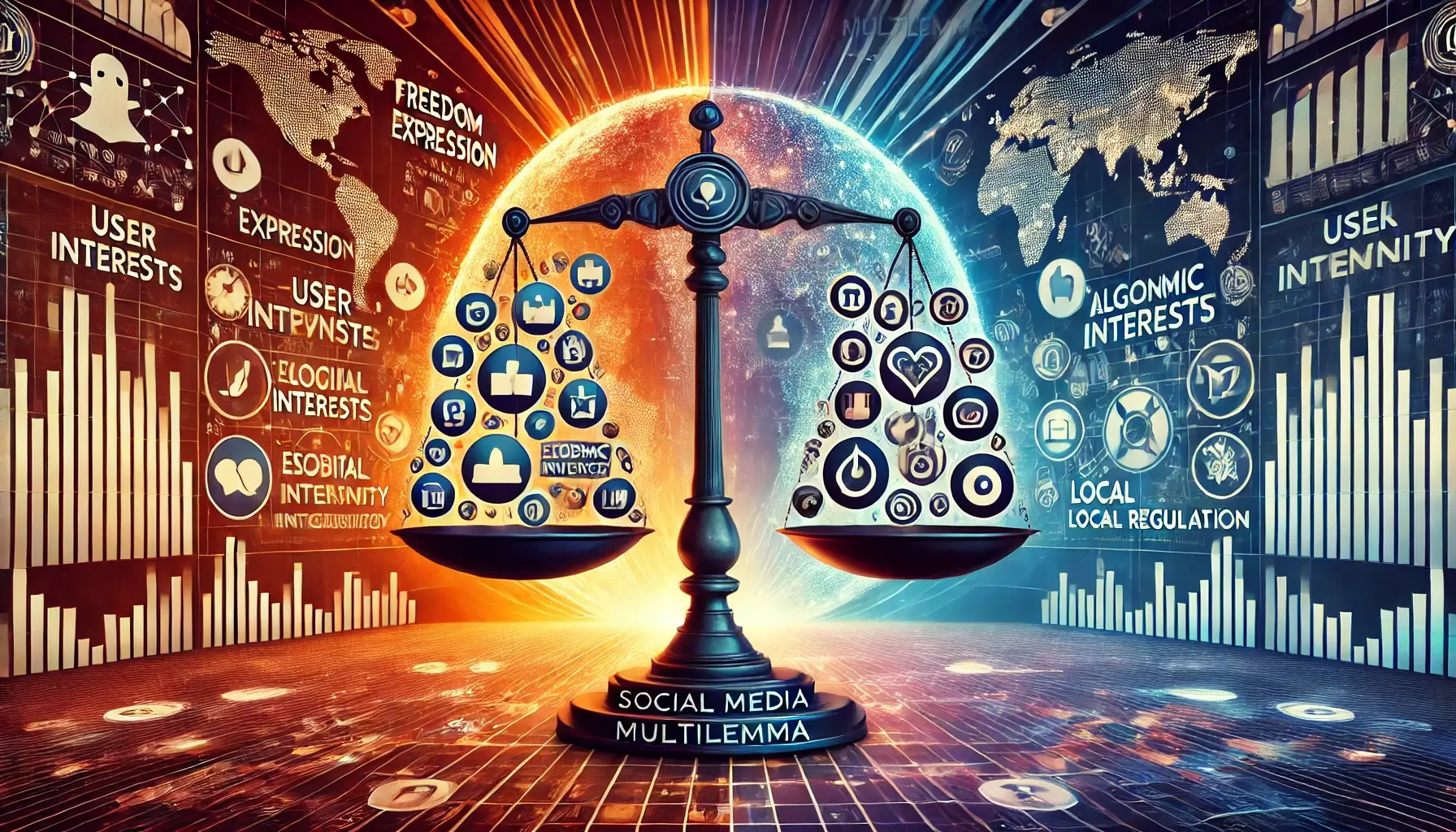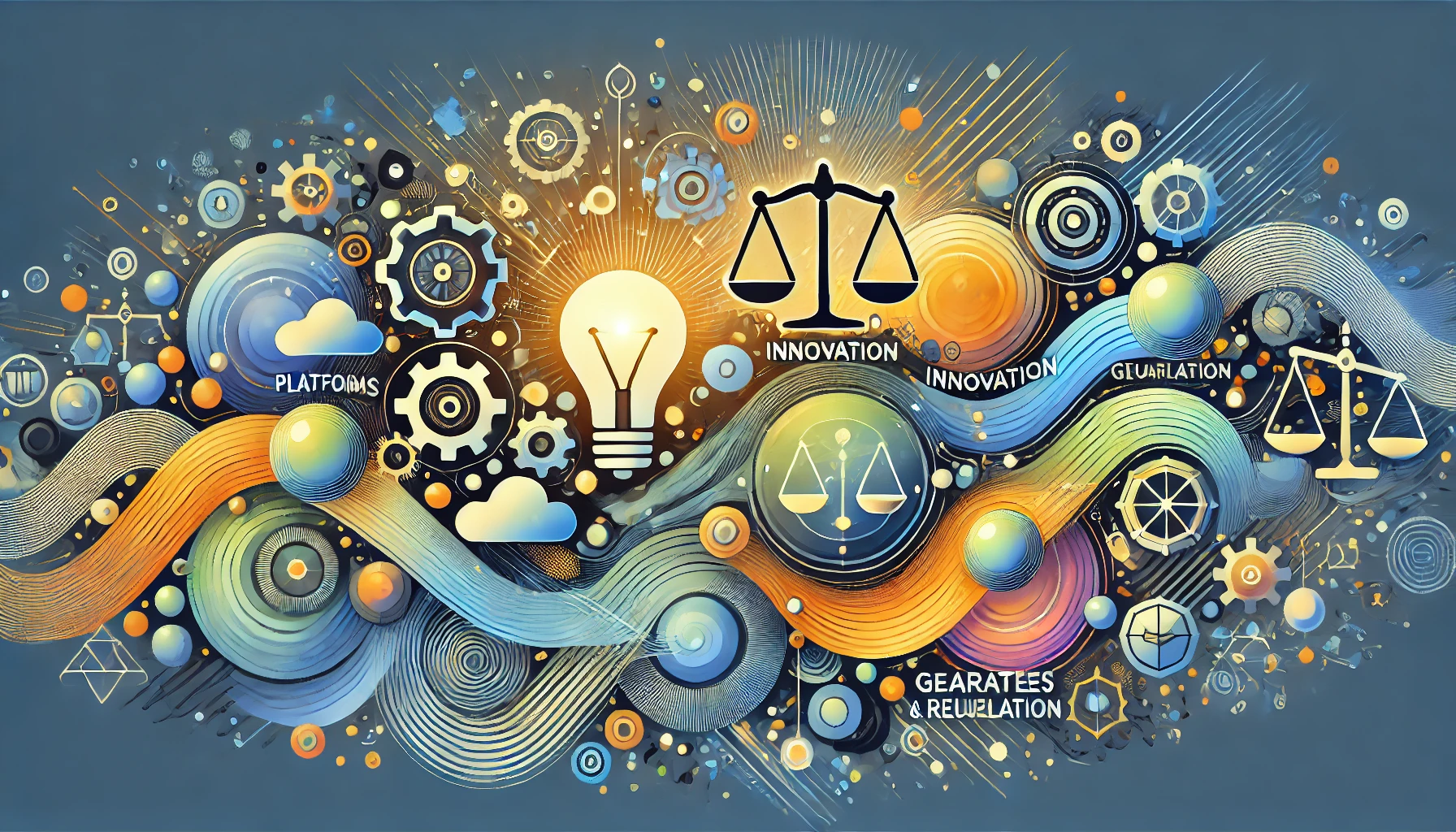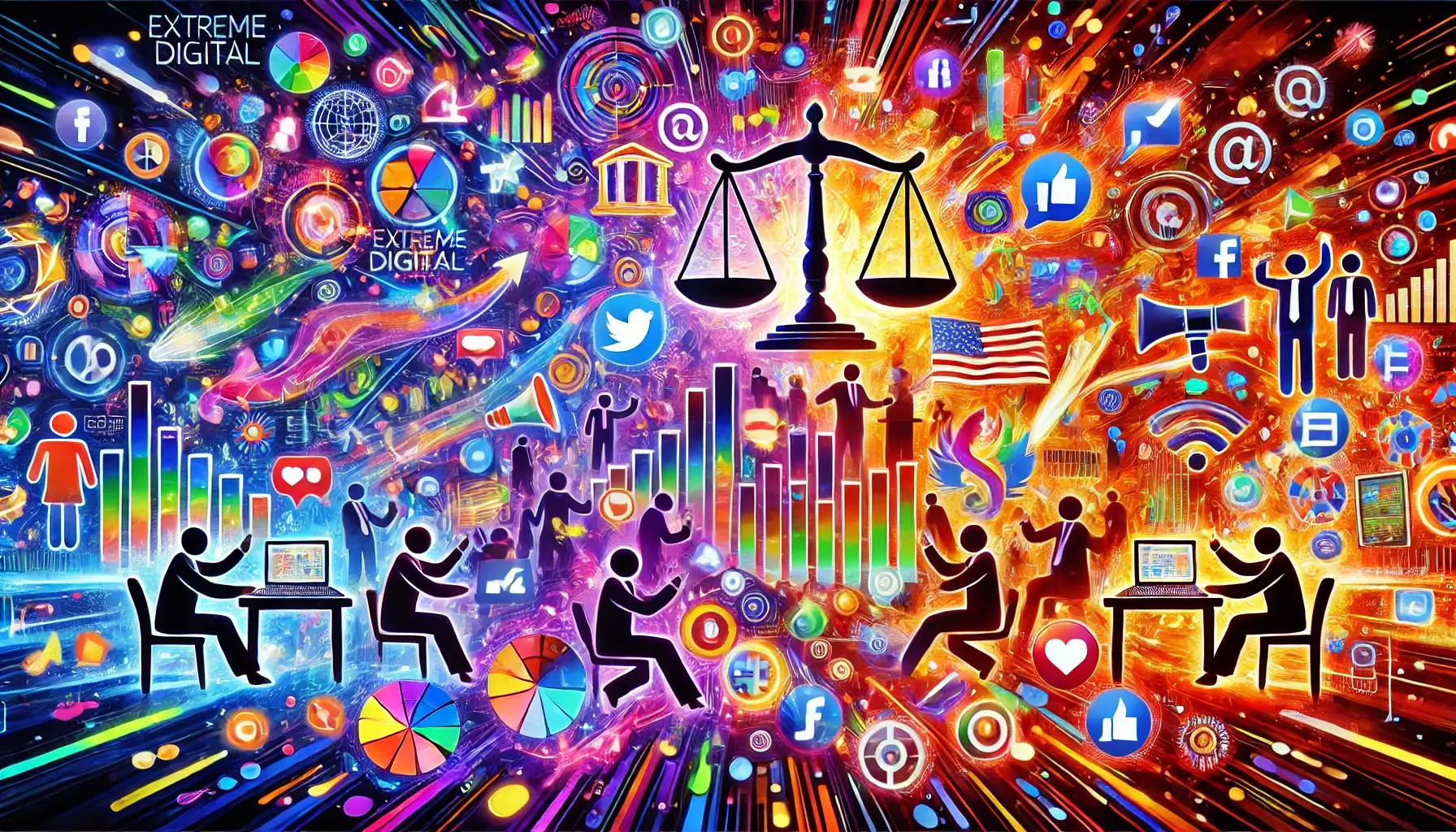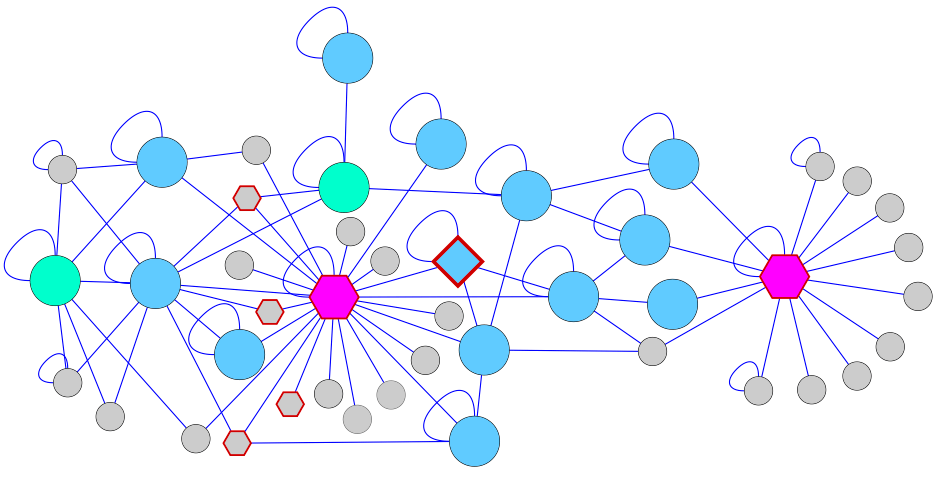1. A Timeline of Social Media
The evolution of social media and the complex issues surrounding freedom of speech on these platforms can be traced through a timeline that highlights key developments in both technology and business models. This timeline illustrates how we arrived at the current multilemma involving free speech, user rights, and factual integrity on social media platforms.
Early Social Networks and the Rise of Cyworld (1999-2003)
1999: Cyworld launches in South Korea, becoming one of the first true social networking sites. It introduced features like:
- Personal profiles called “minihompy”
- Virtual currency (“dotori”) for purchasing digital items
- A hierarchical friendship system reflecting Korean social structures
2001: Cyworld adds the concept of “minihompy” (mini homepage), allowing users to create personalized spaces and invite friends.
2003: SK Telecom acquires Cyworld for $7.5 million, providing resources for growth.
Expansion of Social Networks and New Business Models (2004-2010)
2004:
- Facebook launches, initially limited to college students.
- LinkedIn emerges as a professional networking platform.
2006:
- Twitter introduces microblogging.
- Facebook launches News Feed, algorithmically curating content for users.
2007:
- Facebook introduces targeted advertising based on user data, revolutionizing the social media business model.
The Age of Algorithms and Data-Driven Growth (2010-2016)
2010:
- Instagram launches, focusing on visual content and introducing filters.
2012:
- Facebook surpasses Cyworld in user numbers in Korea, marking a shift in the global social media landscape.
2014-2016:
- Social media platforms increasingly rely on algorithmic content curation to maximize user engagement and ad revenue.
Emerging Challenges and Regulatory Scrutiny (2016-Present)
2016:
- Concerns about misinformation and election interference on social media platforms begin to surface.
2018:
- The Cambridge Analytica scandal reveals the extent of data exploitation on Facebook, leading to increased scrutiny of social media business practices.
2020-2024:
- Debates intensify over content moderation, free speech, and the role of social media in public discourse.
- Governments worldwide propose regulations to address issues of privacy, misinformation, and platform power
Key Shifts in Structure and Behavior
- From chronological to algorithmic feeds: Platforms moved from displaying content chronologically to using algorithms to curate and prioritize content, aiming to increase user engagement.
- Targeted advertising model: The shift to data-driven, targeted advertising became the primary revenue source for most platforms.
- Content moderation challenges: As platforms grew, they faced increasing pressure to moderate content, leading to debates about censorship and free speech.
- Platform monopolization: A few large companies came to dominate the social media landscape, raising concerns about market power and influence over public discourse.
- AI-driven content recommendation: Advanced AI algorithms began shaping users’ information diets, potentially creating filter bubbles and echo chambers.
This timeline demonstrates how social media evolved from simple networking tools to complex, algorithm-driven platforms that now play a significant role in shaping public discourse. The current multilemma stems from the intersection of technological capabilities, business imperatives, and societal concerns about free speech, privacy, and the integrity of information in the digital age.
2. Freedom of Speech & Individual Rights & Factual Accuracy & …
The complex issue of guaranteeing freedom of speech on social media while respecting individual rights and factual accuracy indeed presents a multilemma involving several competing values and stakeholders. This challenge goes beyond a simple dilemma, as there are multiple interrelated factors and perspectives to consider.
Key Agents and Stakeholders
- Social media platforms (e.g. Meta, X)
- Users
- Governments and regulators
- Fact-checking organizations
- Traditional media outlets
- Advertisers
- Civil society organizations
- Academic researchers
- …
Constitutional and Legal Considerations
The First Amendment in the U.S. protects free speech from government censorship, but does not apply directly to private companies. Section 230 of the Communications Decency Act provides liability protection for platforms hosting user-generated content. However, there are ongoing debates about potential reforms to increase platform accountability.
Outside the U.S., many countries have stricter hate speech laws and content regulations that platforms must navigate The EU’s Digital Services Act, for example, imposes content moderation requirements on large platforms.
In Brazil, the legal framework surrounding free speech and content moderation has been evolving rapidly in the last few years. The Lei Geral de Proteção de Dados (LGPD), Brazil’s comprehensive data protection law, came into effect in 2020, establishing strict rules for data processing and user privacy.
However, the current debate in the Brazilian Supreme Federal Court (STF) centers around Article 19 of the Marco Civil da Internet, which currently shields platforms from liability for user content without a court order. STF is considering revising this article to potentially increase platform accountability, similar to trends seen in other countries. This debate has intensified following recent controversies involving social media platforms and government attempts to combat misinformation, leading to a complex balancing act between free speech protections and efforts to regulate online content.
In China, the legal framework governing online speech and content moderation continues to evolve, becoming increasingly comprehensive and restrictive. While the Chinese Constitution nominally guarantees freedom of speech, in practice, these rights are heavily curtailed by specific laws and regulations. The Cybersecurity Law of 2017 remains a cornerstone of China’s digital governance, but recent regulations have further tightened control over online content and data management.
A significant development in late 2024 was the introduction of new guidelines for “self media,” which regulate blogs and social media accounts operated independently of major media organizations. These guidelines require account holders to ensure their posts are factual and to clearly identify sources when discussing current affairs or international politics.
This move reflects the government’s intensified efforts to control the spread of information and shape public discourse, even at the individual user level. Additionally, the Network Data Security Management Regulations and Administrative Regulations on Cyber Data Security, both effective from January 1, 2025, enhance data security requirements and compliance standards for both domestic and international entities operating in China.
These regulations, coupled with the Interim Provisions on Anti-Unfair Competition on the Internet, demonstrate China’s multifaceted approach to regulating the digital sphere, encompassing content control, data security, and market behavior. The introduction of a “minors mode” for mobile devices further illustrates the government’s comprehensive strategy to manage online experiences across different user groups. This evolving regulatory landscape reinforces China’s distinct model of internet governance, characterized by strict state control and the prioritization of social stability and national security over individual expression in the digital realm.
Ethical and Moral Dimensions
There are competing ethical principles at play:
- Protecting free expression and the marketplace of ideas
- Preventing harm from misinformation and hate speech
- Respecting user privacy and autonomy
- Promoting truth and factual accuracy
- Ensuring equal access and non-discrimination
Platforms face difficult tradeoffs between these principles when making content moderation decisions.

Ontological and Epistemological Considerations
The ontological and epistemological considerations surrounding social media and online information environments are indeed complex and multifaceted. Let’s explore these aspects in more detail:
Ontological Considerations
In the digital age, the concept of truth has become increasingly contested. The ontological status of “facts” in online spaces is complicated by:
- The proliferation of conflicting information sources
- The blurring of lines between opinion and fact
- The speed at which information spreads, often outpacing verification processes
As a result, what constitutes “truth” can vary dramatically depending on one’s information ecosystem, leading to fundamentally different ontological realities for different users.
Defining and Measuring Misinformation and Hate Speech
The ontological challenge of defining concepts like misinformation and hate speech is significant:
- Misinformation exists on a spectrum, from unintentional errors to deliberate fabrications
- Hate speech definitions can vary culturally and legally, making universal categorization difficult
- The contextual nature of online communication makes it challenging to create fixed ontological categories for these phenomena
The Ontological Status of Digital Speech Acts
Digital speech acts possess unique ontological properties:
- They can be simultaneously ephemeral and permanent
- Their reach and impact can be vastly amplified compared to offline speech
- The ontological status of algorithmic amplification raises questions about the nature of speech itself in digital contexts
Epistemological Considerations
Belief Formation and Truth Evaluation Online
The epistemological processes by which users form beliefs and evaluate truth claims online are significantly different from traditional methods:
- Users often rely on heuristics like social proof or algorithmic recommendations rather than direct evaluation of evidence
- The abundance of information can lead to cognitive overload, affecting users’ ability to critically assess claims
- Echo chambers and filter bubbles can reinforce existing beliefs, creating epistemic closure
The Role of Algorithms in Shaping Information Exposure
Algorithms play a crucial epistemological role by:
- Determining what information users are exposed to, effectively shaping their knowledge acquisition
- Creating personalized information environments that can limit exposure to diverse perspectives
- Potentially amplifying misinformation or extremist content due to engagement-based optimization
Epistemic Authority and Trust Online
The internet has disrupted traditional notions of epistemic authority:
- Expertise is often challenged or dismissed in online spaces
- New forms of authority emerge based on factors like follower count or viral content
- Trust in information sources becomes increasingly personalized and fragmented
Methods for Verifying Claims at Scale
The epistemological challenge of verifying the vast amount of information online includes:
- Developing automated fact-checking systems that can handle the volume and speed of online claims
- Balancing the need for quick verification with the thoroughness required for accuracy
- Addressing the epistemological limitations of AI in understanding context and nuance
The “Epistemological Crisis”
Some scholars argue that these ontological and epistemological challenges have culminated in an “epistemological crisis”.
This crisis is characterized by:
- The undermining of traditional sources of epistemic authority, such as academic institutions or mainstream media
- A fragmentation of shared reality, where different groups operate with fundamentally different sets of “facts”
- The erosion of common ground for public discourse and democratic decision-making
This crisis poses significant challenges for social cohesion, democratic governance, and the pursuit of shared truth in the digital age.
Potential Approaches and Solutions
Given the complexity of this multilemma, it is very unlikely that there will be, any time, anywhere, a single perfect solution. Some potential approaches include:
- Improved content moderation practices and transparency from platforms
- Empowering users with more control over their information diet
- Investing in digital literacy education
- Developing better AI/ML tools for detecting misinformation
- Creating new regulatory frameworks that balance free speech and harm prevention
- Exploring decentralized or user-governed social media models
- Fostering a healthier information ecosystem through collaboration between platforms, media, academia, and civil society
Ultimately, addressing this challenge will likely require ongoing negotiation between stakeholders to find context-appropriate balances between competing values and interests. As the digital public sphere continues to evolve, our approaches to protecting both free expression and truth will need to adapt as well.
At the same time, while we are discussing these issues…

3. Are we entering a Digital Middle Age?
The concept of a “digital middle age” or “technological feudalism” is indeed gaining traction among scholars and critics of our current digital landscape. While there are compelling arguments for this perspective, it’s important to note that the situation is complex and not entirely analogous to medieval feudalism.
The Rise of Digital Feudalism
Several factors contribute to the perception that we may be entering a new feudal era in the digital realm:
- Concentration of Power: Tech giants like Google, Amazon, Facebook (Meta), and Apple have amassed unprecedented control over digital infrastructure, data, and user behavior.
- Data as the New Currency: Personal data has become a valuable resource, with users often surrendering it in exchange for services, much like serfs worked the land for feudal lords.
- Platform Dominance: Digital platforms act as “fiefdoms” where users (modern “serfs”) contribute content and data, often without fair compensation.
- Surveillance and Control: The extensive data collection and algorithmic manipulation of user behavior mirror the surveillance and control exercised by feudal lords.
- Economic Disparities: The widening gap between tech elites and the general population resembles the inequality of feudal societies.
Epistemological Crisis and Autocracy
The epistemological crisis mentioned earlier is a crucial factor in this digital feudal system:
- Information Manipulation: The ability of tech platforms to shape information flows and influence public opinion contributes to an epistemological crisis, where truth becomes increasingly difficult to discern.
- Algorithmic Echo Chambers: These reinforce existing beliefs and polarize societies, further exacerbating the epistemological crisis.
- Autocratic Alliances: The concentration of digital power in the hands of a few individuals makes it easier for autocratic regimes to exert control over information and manipulate public opinion.
Are We Already in This Era?
There are strong indications that we are indeed experiencing elements of technological feudalism:
- Platform Dependency: Many individuals and businesses are heavily reliant on digital platforms for social interaction, commerce, and information.
- Data Exploitation: The extensive harvesting and monetization of personal data by tech companies is already a reality.
- Algorithmic Governance: Our online experiences are increasingly shaped by algorithms that influence our choices and behaviors.
- Digital Divides: The unequal access to technology and digital literacy creates new forms of social stratification.
However, it’s important to note that our current situation is not a perfect parallel to medieval feudalism:
- Voluntary Participation: Unlike medieval serfs, users can choose (to some extent) which platforms to engage with.
- Global Connectivity: The digital realm transcends geographical boundaries, unlike the localized nature of feudal systems.
- Regulatory Efforts: Governments and international bodies are attempting to curb the power of tech giants through antitrust laws and privacy regulations.
While we are experiencing many characteristics of a “digital middle age” or “technological feudalism,” the situation is more nuanced than a simple return to medieval social structures.
The concentration of power in the hands of tech giants, the exploitation of personal data, and the potential for autocratic control are indeed concerning trends that mirror feudal dynamics.
However, the global nature of our digital ecosystem, the ongoing efforts to regulate tech companies, and the potential for technological innovation to disrupt existing power structures suggest that we are in a unique historical moment that requires new frameworks for understanding and addressing these challenges.
To avoid slipping further into a digital feudal era, it is crucial to promote digital literacy, strengthen privacy protections, enforce antitrust measures, and foster a more equitable digital ecosystem that empowers users rather than exploiting them.
4. A Grand Challenge
To address the growing threat of digital feudalism, we must confront a grand challenge:
creating a more equitable and democratic digital ecosystem that prioritizes user empowerment and societal benefit over corporate exploitation and control.
This challenge requires a multifaceted approach with several grand strategies:
Promoting Universal Digital Literacy
A cornerstone strategy must be to dramatically improve digital literacy across all segments of society. This goes beyond basic tech skills to include:
- Critical thinking about online information and media
- Understanding of data rights and privacy implications
- Awareness of algorithmic influence and bias
- Knowledge of digital civic engagement tools
Implementation could involve:
- Integrating comprehensive digital literacy into school curricula from an early age
- Offering free, accessible digital literacy programs for adults through libraries and community centers
- Partnering with tech companies to provide user-friendly educational resources on their platforms
Strengthening Data Rights and Privacy Protections
Robust legal frameworks are needed to safeguard individual data rights and privacy. Key elements should include:
- Stricter regulations on data collection, use, and sharing
- Mandatory opt-in consent for data collection
- Enhanced transparency requirements for algorithmic decision-making
- Right to data portability and deletion
This could be achieved through:
- Passing comprehensive federal privacy legislation
- Empowering regulatory bodies with stronger enforcement capabilities
- International cooperation to establish global data protection standards
Enforcing Antitrust Measures and Promoting Competition
To counter the monopolistic tendencies of big tech, we must:
- Break up digital monopolies and prevent further consolidation
- Lower barriers to entry for new competitors
- Ensure interoperability between platforms
Strategies might include:
- Updating antitrust laws to better address digital market dynamics
- Increasing funding and resources for antitrust enforcement agencies
- Mandating data sharing and interoperability standards
Fostering Digital Commons and Public Infrastructure
To reduce dependence on corporate platforms, we should invest in:
- Open-source alternatives to key digital services
- Public digital infrastructure (e.g., municipal broadband networks)
- Digital public spaces for civic engagement and cultural exchange
This could involve:
- Government funding for open-source software development
- Public-private partnerships to build digital commons
- Incentives for municipalities to create local digital infrastructure
5. Rebalancing the Digital Economy
We must reshape the economic incentives of the digital world to favor user empowerment over exploitation. Strategies could include:
- Exploring alternative business models beyond surveillance capitalism
- Implementing digital wealth redistribution mechanisms (e.g., data dividends)
- Supporting platform cooperativism and user-owned digital services
This might be achieved through:
- Tax incentives for user-centric business models
- Legislation mandating profit-sharing from data monetization
- Public investment in cooperative digital platforms
Promoting Global Digital Rights and Governance
Given the transnational nature of the digital world, we need:
- International cooperation on digital rights and governance
- Mechanisms to ensure democratic oversight of global digital infrastructure
- Efforts to bridge the global digital divide
Approaches could include:
- Establishing a global treaty on digital rights
- Creating multi-stakeholder governance bodies for critical internet infrastructure
- Increasing international aid for digital development in underserved regions
Cultivating Ethical Technology Development
To ensure future technologies serve the public good, we should:
- Integrate ethics and social impact considerations into tech education and development processes
- Encourage responsible innovation that prioritizes societal benefit
- Develop frameworks for assessing the long-term implications of emerging technologies
This could be implemented through:
- Mandatory ethics courses in computer science and engineering programs
- Public funding tied to ethical development practices
- Creation of independent technology assessment bodies
Addressing this grand challenge will require sustained effort, collaboration between governments, civil society, and the private sector, and a willingness to reimagine our digital future. By pursuing these grand strategies, we can work towards a more equitable digital ecosystem that empowers users, protects rights, and serves the broader interests of society.
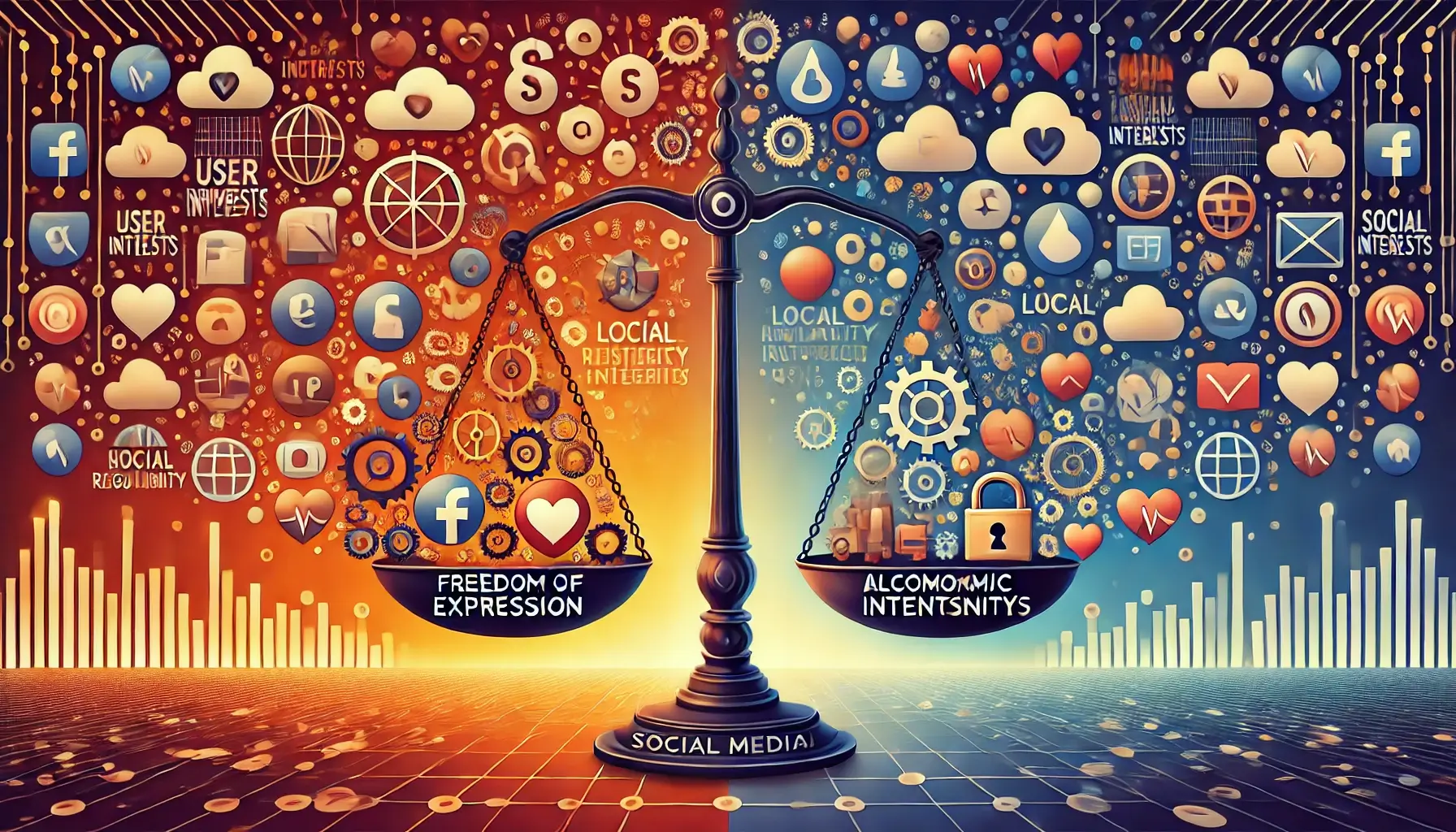
6. All in all… How to Solve this Multilemma?…
The multilemma solving approach offers a valuable framework for addressing the complex challenges posed by social networks, their side effects, and their power over society. This approach recognizes that the issues surrounding social media are multifaceted and interconnected, requiring a nuanced understanding of various competing interests and potential solutions.
Key Dimensions of the Social Media Multilemma
- Freedom of Expression vs. Harm Prevention: Social media platforms must balance protecting free speech with mitigating the spread of harmful misinformation, hate speech, and other problematic content.
- User Privacy vs. Platform Functionality: Platforms need user data to function effectively, but this conflicts with growing concerns about data privacy and exploitation.
- Economic Interests vs. Social Responsibility: Social media companies face pressure to maximize profits while also addressing their societal impact and ethical obligations.
- Algorithmic Engagement vs. User Well-being: Engagement-driven algorithms can boost platform usage but may contribute to addiction, polarization, and the spread of misinformation.
- Global Reach vs. Local Regulation: The transnational nature of social media clashes with varying national laws and cultural norms regarding speech and content moderation.
Applying the Multilemma Approach
To address these interconnected challenges, a multilemma solving approach would involve:
- Stakeholder Engagement: Involve diverse perspectives, including users, platforms, regulators, civil society organizations, and researchers, to develop comprehensive solutions.
- Multidimensional Analysis: Utilize tools like social listening and multidimensional data analysis to understand the complex dynamics of online discourse and user behavior.
- Adaptive Policymaking: Develop flexible regulatory frameworks that can evolve with technological advancements and changing social norms.
- Ethical AI Development: Promote the development of AI systems that balance engagement with user well-being and societal benefit.
- Digital Literacy Initiatives: Invest in widespread digital literacy programs to empower users to navigate social media responsibly and critically evaluate information.
- Transparency and Accountability Measures: Implement mechanisms for greater platform transparency and accountability, such as regular audits and public reporting on content moderation practices.
- Collaborative Content Moderation: Explore decentralized or collaborative approaches to content moderation that involve users and external experts.
- Alternative Business Models: Investigate and promote business models that align platform incentives with user and societal well-being, rather than solely maximizing engagement.
By embracing this multifaceted approach, stakeholders can work towards a more balanced and responsible social media ecosystem that harnesses the positive potential of these platforms while mitigating their negative impacts on individuals and society.
7. Conclusion [?]
To conclude this debate on the multilemma of social media, freedom of speech, and societal impact, we can synthesize the key points and look towards future directions:
- Complexity Recognition: We’ve established that the challenges posed by social media platforms constitute a true multilemma, involving numerous interconnected issues that resist simple solutions. This recognition is crucial for developing effective approaches.
- Multistakeholder Approach: Addressing these challenges requires collaboration among diverse stakeholders, including tech companies, governments, civil society, and users. No single entity can solve these problems in isolation.
- Adaptive Governance: Given the rapid pace of technological change, we need flexible and adaptive governance frameworks that can evolve with new developments while upholding fundamental rights and values.
- Balancing Act: At the core of this multilemma is the need to balance competing interests: free speech, privacy, safety, innovation, and economic viability. There’s no perfect equilibrium, but rather an ongoing process of negotiation and adjustment.
- Digital Literacy: Empowering users through improved digital literacy is a critical component of any comprehensive solution, enabling individuals to navigate the complex digital landscape more effectively.
- Technological Solutions: While technology has created many of these challenges, it also offers potential solutions, such as advanced AI for content moderation and decentralized social media models.
- Ongoing Dialogue: This debate is far from over. As social media continues to evolve, so too must our approaches to governing it. Continuous research, debate, and policy experimentation will be necessary.
In essence, addressing the social media multilemma requires a holistic, adaptive, and collaborative approach that recognizes the complexity of the issues at hand. While we may not find perfect solutions, by embracing this complexity and working together, we can strive for a digital ecosystem that better serves humanity’s diverse needs and values.
